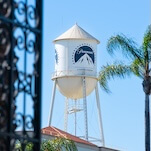In a new report brought to you by the letter “O,” and the words “God, this is really happening,” The Hill reports that President-elect Donald Trump intends to eliminate the National Endowment For The Arts and the National Endowment For The Humanities, and privatize the Corporation For Public Broadcasting, the government entity that partially funds both NPR and PBS. The cuts, which were hinted at by unnamed members of Trump’s transition team, are part of a so-called “skinny budget” being pushed forward by conservative think tanks, and which is apparently being adopted by the administration, and will remove a whopping 0.02 percent from the $3.8 trillion federal budget.
They’ll also remove a favorite target for conservative snipe hunting; criticisms of the NEA date back at least to the Reagan Administration, and periodically crop up any time a GOP bigwig gets the urge to find a pee-covered Christ to kick. (For the record, Reagan was convinced to keep the NEA alive by his equally conservative advisors, who found that there were actual merits in the U.S. government subsidizing and supporting the arts.) The NEA—and its museum-supporting cousin, the NEH—both receive roughly $150 million a year from the government, much of which is distributed to grants programs in individual states. That makes it the biggest arts granting organization in the country, while still representing a sum that’s so paltry on the federal level that it’s pretty clear Trump’s cuts will be mostly symbolic, rather than the simple belt-tightening he might choose to claim.
The move to privatize the CPB feels like a similar cultural warning shot, even as the vagaries of public TV and radio funding make for a more complicated question of what “privatization” would actually mean for the non-profit group. The Corporation receives $445.5 million from the government every year, about half of which goes to the nation’s roughly 350 public television stations. They, in turn, give the money in fees to the non-profit PBS, which distributes ad-free content like PBS NewsHour, and Frontline, programs that have long been held up as high standards for educational, informative TV. (The Corporation also gives a relatively small amount of money—$26.6 million—directly to PBS to support its operating costs.) The rest of the stations’ money, totaling roughly half of their operating budget, comes from public support, in the form of charitable donations and the ever-present pledge drive. A similar setup exists over in radio, although NPR was “weaned” off of federal cash back in the ’80s, meaning only about 10 percent of the system’s money comes directly from the government. That’ll presumably all be cut back under the new federal budget, although it’s not clear where the money for the privatized CPB Trump is apparently eyeing would be drawn from, or what influence new investors would have on the content of the public-minded programming it exists to support and spread.
At least Elmo and company will be safe: Public TV stations currently get access to new episodes of Sesame Street for free (after a nine-month exclusivity delay) as part of the five-year deal the beloved kids program signed with HBO in 2015.







































